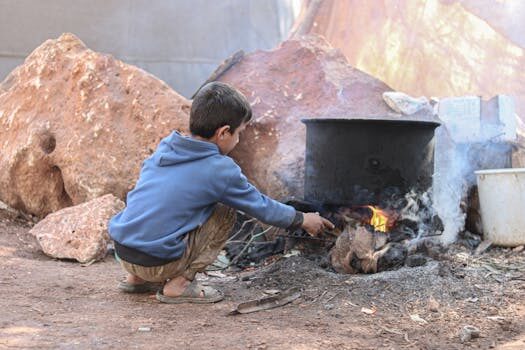Here's what to do when your toddler or child is throwing up

Vomiting can be a distressing experience for both children and parents. It is essential to understand the causes, how to manage the situation at home, and when to seek medical attention. This comprehensive guide will help you navigate through this challenging situation.
In the following sections, we will explore the different aspects of vomiting in children, including common causes, home treatments, and preventive measures. By understanding these factors, you will be better equipped to handle vomiting effectively.
What causes vomiting in children?
Vomiting in children can occur for various reasons. Some of the most common causes include:
- Gastroenteritis: This inflammation of the stomach and intestines often leads to vomiting and diarrhea.
- Food allergies: Certain foods may trigger an allergic reaction, resulting in vomiting.
- Infections: Respiratory infections or other illnesses can cause nausea and vomiting as a symptom.
- Overeating: Consuming too much food can overwhelm a child's stomach, leading to vomiting.
- GERD: Gastroesophageal reflux disease can cause acid to flow back into the esophagus, resulting in vomiting.
Understanding these causes is crucial for parents. Recognizing the underlying issue can help in determining the best course of action. While vomiting is often not serious, it is vital to monitor your child closely.
What should I do if my child is vomiting?
When dealing with a vomiting child, the first step is to remain calm and assess their condition. Here are some essential actions to take:

- Keep them hydrated: Offer small sips of clear fluids like water or oral rehydration solutions.
- Avoid foods: Don't give solid foods immediately after vomiting, as this can irritate the stomach.
- Rest: Encourage your child to rest; this can help their body recover.
- Monitor symptoms: Keep an eye on any additional symptoms, such as fever, diarrhea, or excessive lethargy.
- Seek medical advice: If symptoms persist or worsen, consult your healthcare provider.
By following these steps, you can help your child manage the situation more effectively. Remember, hydration is key in preventing complications such as dehydration.
How is vomiting treated at home?
Home care for vomiting children focuses on comfort and hydration. Here are some effective strategies:
- Start with clear liquids: Begin with small amounts of broth, water, or electrolyte solutions.
- Gradually introduce bland foods: Once vomiting subsides, introduce bland foods like rice, toast, or applesauce.
- Avoid dairy products: Dairy can aggravate the stomach; wait until your child is fully recovered before reintroducing these foods.
- Use ginger: Ginger tea or ginger ale can help alleviate nausea in some children.
- Maintain a calm environment: Reduce noise and distractions to help your child relax.
These home remedies for vomiting can significantly ease your child's discomfort and promote recovery. Always keep in mind that every child is different; what works for one may not work for another.
When should I call my child's doctor about vomiting?
Knowing when to seek professional help is crucial. You should contact your healthcare provider if:
- Vomiting persists: If your child continues to vomit for more than 24 hours.
- Signs of dehydration: Look for symptoms like dry mouth, decreased urination, or lethargy.
- Severe abdominal pain: This could indicate a more serious condition.
- Unusual vomit colors: Green, yellow, or blood-tinged vomit may require immediate attention.
- Fever: If your child has a high fever along with vomiting, consult a doctor.
Being proactive about your child's health can prevent complications. Always trust your instincts; if something feels off, it's better to err on the side of caution.

What are home remedies for vomiting in toddlers?
Many parents wonder what to do when their toddler is vomiting. Here are some effective home remedies:
- Chamomile tea: This can help soothe the stomach and reduce nausea.
- Flat ginger ale: It can ease stomach discomfort when consumed in moderation.
- Rice water: Boil rice in water, strain it, and give the water to your child to sip.
- Small ice chips: Allow your child to suck on ice chips to stay hydrated.
These remedies for toddler vomiting are gentle and can provide relief. However, always consult your pediatrician before trying new treatments.
How can I prevent vomiting in my child?
Preventing vomiting begins with maintaining good health practices. Here are some effective prevention strategies:
- Encourage handwashing: Teach your child to wash their hands regularly to reduce the risk of infections.
- Avoid sick individuals: Limit exposure to people who are ill to prevent the spread of viruses.
- Monitor food intake: Ensure your child eats balanced meals and doesn’t overeat.
- Stay updated on vaccinations: Vaccinations can help protect against illnesses that cause vomiting.
Implementing these preventive measures can significantly reduce the chances of your child experiencing vomiting due to illnesses like gastroenteritis.
What symptoms are related to vomiting in children?
Understanding the symptoms that accompany vomiting can help in assessing your child's condition. Some common symptoms may include:

- Diarrhea: Often occurs alongside vomiting, especially in cases of gastroenteritis.
- Fever: A high fever may indicate an underlying infection.
- Abdominal pain: This could suggest various gastrointestinal issues.
- Lethargy: Excessive tiredness may signal dehydration or illness.
Recognizing these symptoms is critical for determining the need for medical intervention. Always pay attention to your child's overall condition.
Related questions about managing vomiting in children
What to do if a toddler is throwing up?
When a toddler is throwing up, focus on keeping them hydrated with small sips of clear fluids. Avoid solid foods until the vomiting subsides. Additionally, monitor for any severe symptoms that require medical attention.
What is the fastest way to stop vomiting?
The fastest way to stop vomiting is to allow the stomach to settle. Providing clear fluids and avoiding solid foods can help. Ginger tea or flat soda may also relieve nausea. Always ensure that your child stays hydrated to prevent dehydration.
What is the best home remedy for vomiting a toddler?
One of the best home remedies for toddler vomiting is ginger. Offering ginger tea or ginger ale can soothe the stomach. Additionally, sips of clear fluids like broth can help keep them hydrated while their stomach settles.
What to give your child after they throw up?
After your child throws up, wait for a short period before offering anything. Once they seem ready, give them small sips of water or an oral rehydration solution. Gradually reintroduce bland foods like toast or crackers as they begin to feel better.

For additional information, you may find this video helpful: